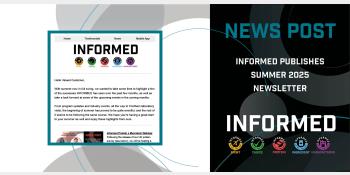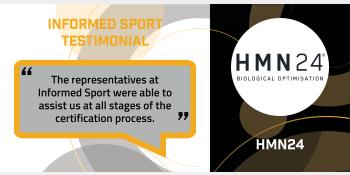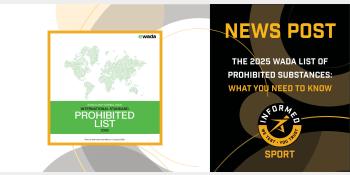INFORMED SPORT NEWS
Informed Sport: Athlete Protection and the World Anti-Doping Code
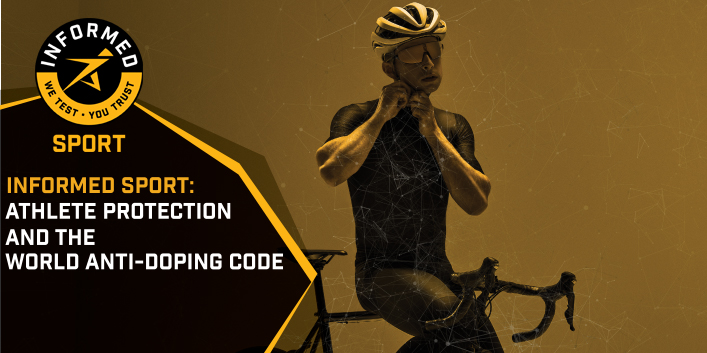
To support the rigors of training and competition, an ever increasing number of elite athletes use supplements to support their workouts, recovery and performance. It is vital that athletes make supplement choices with the maximum protection available to them under the World Anti-Doping Code (Code) to reduce risks often associated with the use of these products.
Supplements can present a doping violation risk to athletes due to the potential for contamination with substances banned in sport. Informed Sport minimises this risk and provides further assurance by enabling the testing and due diligence required of the Code.
Contamination Risks
Contamination can happen during the manufacturing process – this is called ‘cross contamination' - and is especially high risk if manufacturers also handle banned substances in their facilities. It can also occur if manufacturers use an ingredient that inadvertently contains a banned substance.
Ingredients pose an increasing challenge due to the widespread use of botanical materials that contain naturally-occurring compounds that have the potential to cause a doping violation.
Athletes also need to be mindful that some disreputable manufacturers adulterate products with banned substances. This practice is known as ‘spiking’.
We know contaminated supplements are a risk because of studies conducted over the last two decades, and because of anti-doping violations that have resulted from contaminated products. This is called ‘inadvertent doping’ and some very high-profile athletes have served sanctions and had their careers tainted as a result.
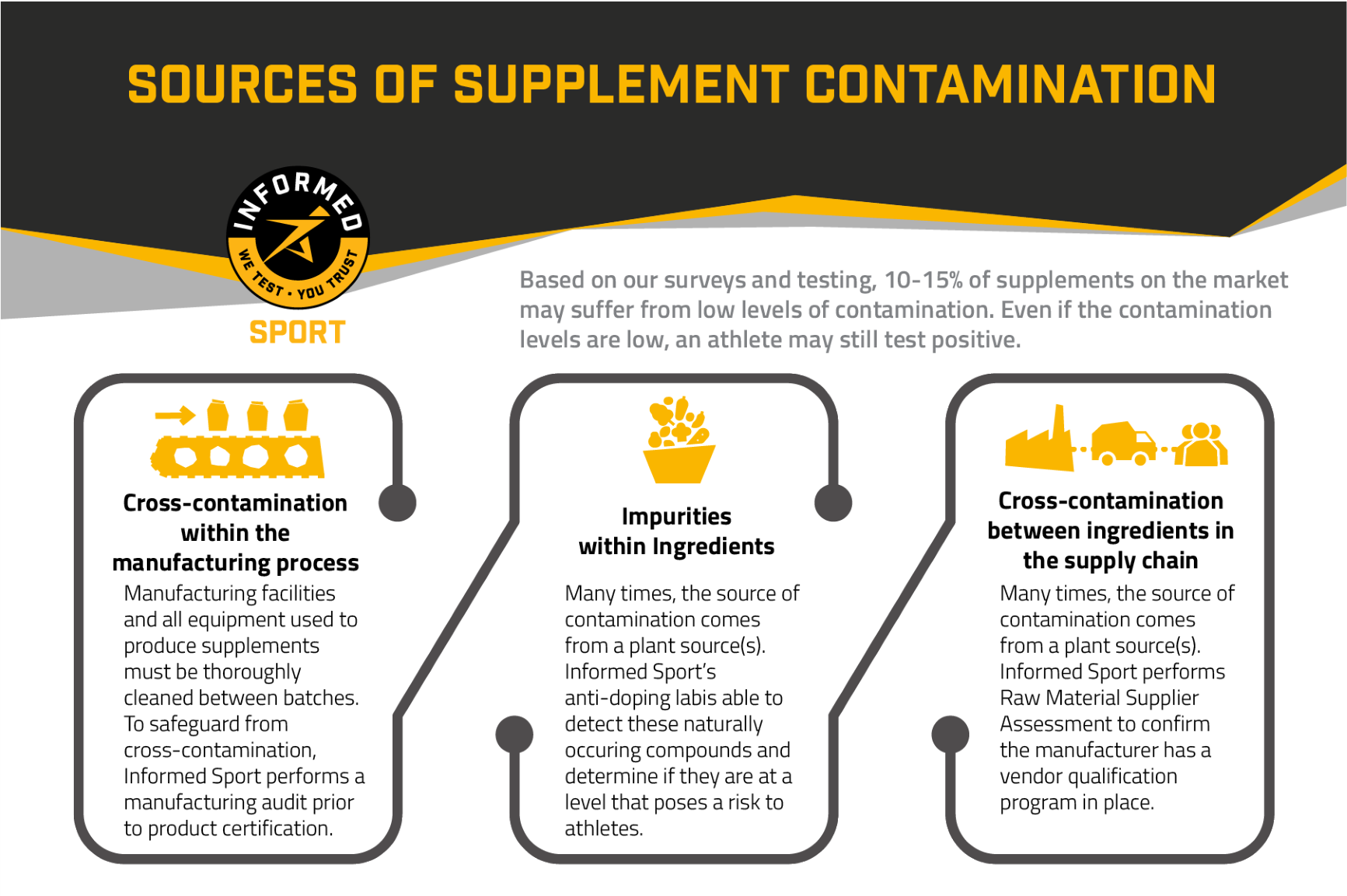
Athletes, their support personnel (coaches, nutritionists, performance directors), sporting organisations and the anti-doping community need to be extremely mindful of these risks. Unfortunately, the advice and guidance given to elite athletes around supplement use is often inconsistent, which makes the Informed Sport programme even more important.
World Anti-Doping Code
The World Anti-Doping Code governs anti-doping rules and regulations for most sports across the world. It is underpinned by the principle of ‘strict liability’, which means an athlete is fully responsible for whatever they ingest, even if it is by accident.
However, the Code also recognises that a contaminated supplement can lead to a failed drugs test. Article 10.6.1.2 makes it very clear that if an athlete can show that their doping violation was due to a contaminated product – food as well as supplements – then there is recourse for them to have their sanctioned reduced.
The article states: “In cases where the Athlete or other Person can establish both No Significant Fault or Negligence and that the detected Prohibited Substance (other than a Substance of Abuse) came from a Contaminated Product, then the period of Ineligibility shall be, at a minimum, a reprimand and no period of Ineligibility, and at a maximum, two years Ineligibility, depending on the Athlete or other Person’s degree of Fault.”
|
|
|
Athlete Due Diligence
But to gain maximum protection under the Code, athletes must also be able to show they “exercised a high degree of caution before taking the Contaminated Product” (World Anti-Doping Code 2021: comment 66). This caution is best shown by performing due diligence ahead of using a product, and Informed Sport is the most effective way of meeting this requirement.
|
|
Athletes should always take the advice of a trained sports nutritionist or dietitian to help decide what supplements best meet their needs, body types, sporting activity, etc. Their due diligence should then include a series of actions to ensure:
-
the product is certified by a third-party testing programme
-
the programme requires secure sample storage of EVERY batch if future testing is needed
-
the batch they are using has been tested by an ISO 17025 accredited laboratory
-
product names and batch numbers are recorded
-
product names and batch numbers are entered on their doping control forms
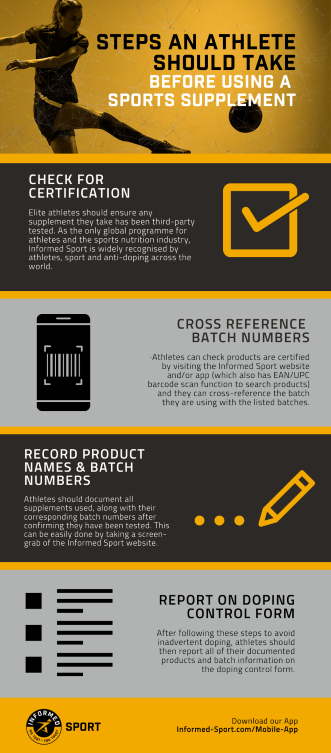
|
Informed Sport Protection
Informed Sport was developed in 2008 with the support of the national anti-doping agencies in the UK and the Netherlands (UKAD and Dutch Anti-Doping), along with sports scientists and industry experts, specifically to protect athletes.
Two of the pillars of Informed Sport are that every batch of a certified product must be tested before it goes on sale - thus reducing the possibility of an athlete using a non-tested batch – and that a sample of every batch must be securely stored for future testing.
These pillars allow athletes to perform maximum due diligence required of the Code.
Athletes can check products are certified by visiting the Informed Sport website and/or app (which has a EAN/UPC barcode scan function to search products) and they can cross-reference the batch they are using with the listed batches, using screen grabs and photos to easily store this information.
Finally, if an athlete believes a product was the cause of a violation, they are able to have the stored sample tested in order to establish “that the detected Prohibited Substance came from a Contaminated Product” as per Code Article 10.6.1.2.
Following these simple steps will allow athletes to use supplements with confidence and avoid inadvertent doping.
Global Programme and Recognition
As the only global programme for athletes and the sports nutrition industry, Informed Sport is widely accepted by athletes, sporting organisations and anti-doping bodies across the world.
Athletes can be assured that no matter where a product is manufactured or retailed, if it is certified on Informed Sport then it has gone through the most rigorous of assessments and undergoes every-batch testing.
A growing number of sports and anti-doping organisations recognise Informed Sport as providing much-needed athlete protection, including the International Testing Agency (ITA), which performs anti-doping activities for sporting bodies and events worldwide. Informed Sport has renewed its partnership with the ITA to provide education support for athletes via its monthly educational webinar series for 2022.
Informed Sport's robust and harmonised approach to risk management was highlighted in a webinar dedicated to nutrition and dietary supplements, which can be viewed on-demand below.
Minimising the Risk with Informed Sport
Recognised by numerous anti-doping organisations and sporting bodies, elite athletes can trust their reputation and careers with Informed Sport certified products. Select a product carrying the Informed Sport logo cross-reference the batch number using the Informed Sport website or mobile app to confirm it's testing information which is listed on each product page.



